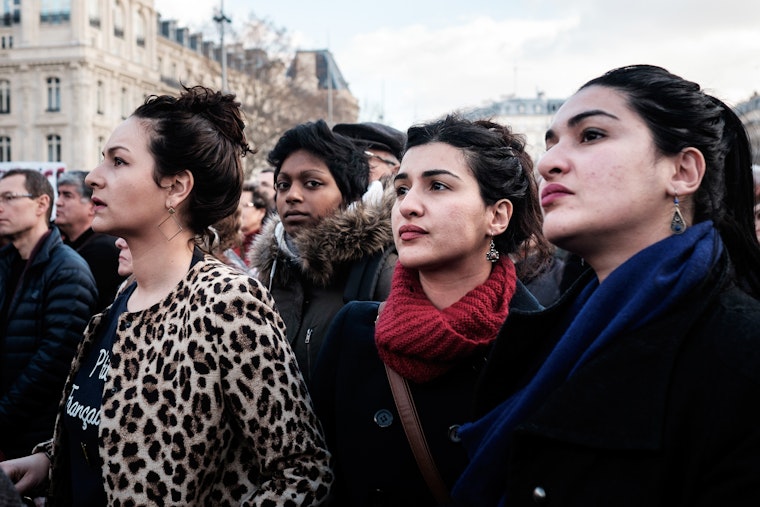Baton Rape Case Fuels Anger over Racist Policing in France
By Lanna Hollo

In the late afternoon of February 2 this year, French police in the Paris suburb of Aulnay-sous-Bois began carrying out identity checks on a group of young men outside one of the town’s large public housing developments.
There was nothing unusual about the operation. But it resulted in a 22-year-old man with no criminal record being forced to the ground, beaten, and anally raped with a police baton.
The black victim, identified only as Theo L., suffered serious injuries to the rectum, requiring major emergency surgery. A police officer was subsequently charged with rape, and an investigation into the events surrounding the assault is continuing. Since the events, there have been regular protests across the country, some leading to clashes between protestors and police
The events recall other protests that have for decades regularly shaken France’s poor suburbs, after local residents, usually young men, suffered injuries or death in incidents involving the police—notably in 1981 in Venissieux, in 1994 in Rouen, in 2005 in Clichy-sous-Bois, in 2007 in Val d’Oise, in 2009 in Montreuil, to name some of the most infamous.
These incidents have fueled the public debate about the way that the French police interact with minority communities. Reformers, including the Open Society Foundations and their partners, have argued for an end in particular to the frequent, persistent, and aggressive stop and search practices that disproportionally focus on minority groups, and which have repeatedly sparked community outrage.
But the Theo scandal has also brought into the open an aspect of this use that some have hitherto been unwilling to address—the extent to which sexual abuse and even assault is often part of the abuse to which young people are subjected during police stops.
The last time this issue was headline news was in December 2015, when 18 junior high and high school students brought a group legal complaint against the local police in the 12th Arrondissement of Paris. The complaint, filed by lawyers Slim Ben Achour and Félix de Belloy, and supported by a number of local French associations, alleged that over a two-year period police officers had repeatedly carried out body searches that amounted to sexual assault together with other forms of physical abuse and harassment, and that they had singled out for retaliation anyone who tried to complain.
Previously, questions of sexual abuse by police had focused on individual cases, usually dismissed by the police as the work of one or two bad officers. The lawsuit, and the media attention around it, marked a first shift towards considering sexual harassment and abuse as a systemic problem that the police need to address.
Now the Theo case has led to a further shift. Survivors of assaults, both present and past, are now speaking publicly and bravely about these humiliating and degrading experiences and demanding reform. This is a major development as this was a taboo subject that victims did not speak about for a variety of reasons: shame, fear of reactions of family and friends, a feeling of powerlessness, and fear of police reprisals.
At the same time, there has been a gradual evolution over the past five years in public awareness of the inherent problems of police stops that single out visible minorities (known in French as controle à facies). Legal action, supported by the Open Society Justice Initiative, led to a landmark ruling from the highest civil court in November last year that police stops based on the way someone looks or their supposed ethnic origin are illegal, increasing pressure on the police to change their practices and record keeping.
Yet the politically powerful police unions remain opposed to any constructive reform efforts—including the principle that all stops should be properly recorded to enable a proper understanding of who is being stopped, and why.
The depths of the problems with policing culture in France was made abundantly clear the week after the assault on Theo L. when a leader of the largest police union argued on television that a derogatory, racist term used by police to insult Theo during the encounter was “fairly acceptable.” The comment provoked wide public outcry and a rebuke from the Interior Minister.
The importance of establishing a new relationship between the police and minority communities has been underlined by French political leaders for many years.
However, statements have failed to translate into badly needed reforms. Instead, while protests and debates over the widespread nature of police abuse dominate the media, the French Parliament incongruously passed another security law extending police powers to use weapons and increasing penal sanctions for the offenses of “insult and rebellion,” charges regularly brought against young people reacting against identity checks and frisks.
As France gears up for presidential and parliamentary elections this year, the issue of what constitutes truly effective policing will be bitterly contested. The case of Theo has clearly demonstrated the need for a change in the model of French policing, if there is to be any hope for building a more cooperative future for the policing of minority communities. Or, as Le Monde, the leading French establishment daily, noted: “France is the European country where the general public has least trust in the police, and where the police most disregard the public. The presidential campaign needs to include a great debate on how to defuse this formidable machine that only serves to generate discontent.”
Lanna Hollo is a senior legal officer with the Open Society Justice Initiative, working on combatting ethnic profiling in Europe.